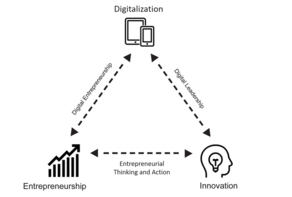Research Focuses
This research area deals with the ways of thinking and acting of founders of innovative growth companies. These firms often differ significantly from the behavior of other actors in the economy (e.g., CEOs or salaried employees). The questions in this area deal, among other things, with the handling of resources (e.g. bricolage), but also with psychological factors such as the well-being and health of founders.
In this area, the strategy and growth paths of companies are researched. Relevant questions target, among other things, the strategic orientation of companies (e.g. entrepreneurial orientation) as well as success-critical factors and skills of companies and employees. In addition, the various paths of internationalization offer interesting insights into the growth of companies, both young and established.
Digitization offers enormous innovation potential for startups, so that associated digital entrepreneurship has developed into an independent research area. This raises numerous questions about the differences and similarities between digital and non-digital startups and innovations, as well as the prerequisites / capabilities and consequences / performance of digital innovations.
Nearly nothing is currently influencing business models as much as digitization. Companies can exploit the disruptive potential of digital technologies and solutions by adopting suitable business models. The focus is often laid on platform-driven business models in the context of the so-called platform economy. Relevant questions deal on the one hand with value creation and value distribution on digital platforms and on the other hand with technological issues and how the design of such platforms can contribute to their success.
Digitalization often presents established companies with major challenges. As part of the digital transformation, they not only have to bring their business models into the digital age in order to remain competitive but also change their organizational structure and the ways in which their employees think and act. In addition to establishing a company-wide culture of innovation and error, this also includes topics from the areas of new work / work 4.0 and successful digital leadership.


